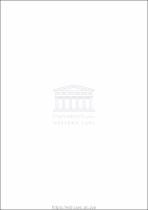Social workers in the transition of social welfare : A descriptive-dialogical enquiry
Abstract
The time period of this study is the contemporary first half of the Nineties, a momentous time in the history of South Africa. The country is passing from apartheid (the "old" South Africa) to the hope of democracy (the "new" South Africa). Nelson Mandela was inaugurated as President of South Africa in May 1994. Social workers, too, find themselves in transition. What is the thinking of experienced progressive social workers at this historical moment, concerning themselves and their profession within its context of social welfare as societal
institution? This is the question I explore, specifically with reference to senior social workers within the area of greater Cape Town It is important to note that in terms of the research philosophy underlying this enquiry, the methodological process of the thesis is integral to its substance. My approach, along "New Paradigm" lines, is descriptive dialogical. Implicit in it is a "confrontation of the positivistic epistemology of 'The Scientific Method' in the misguided sense of an 'absolute and only' method of science, which unfortunately is still prevalent in standard practices of enquiry inside and outside the university" (see Note [i] at the end of this Summary). My thesis therefore offers not only outcomes but, as much as possible, also the process of the enquiry. A descriptive-dialogical approach also takes the idea of narrative seriously, "narrative being a mode that makes room for in fact, that insists on more than merely written presentation" (see Note [ii] at the end of this Summary). My research philosophy and methodology accommodate as far as possible "the whole academic and professional potential of a student, rather than just the student's writing potential" (see Note [iii] at the end of this Summary). In line with this, I
submit as an accompaniment to this writing -- and as holistically intrinsic to this thesis -- a relevant video-recording and audio recordings
illustrating myself at work in the execution of this study. In conclusion of this Summary I must indicate my promoter's and
my own serious commitment to the possibility of creative indigenousness of academic style and presentation. This must be viewed within African and South African context, and it explains much of the "humanistically holistic" tenor of this study. This, of course, is in no way intended to discount the worthwhileness and substantiality, in fact the necessity for us, of recourse to the best tenets of European and Euro-American university tradition.

